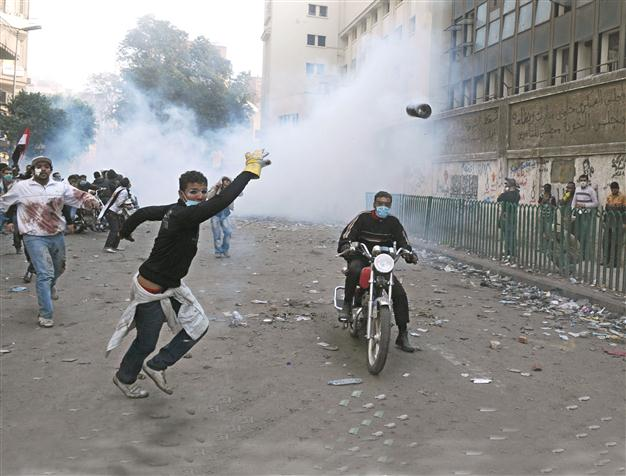Crowds swell as Egypt army starts crisis talks
CAIRO

A swelling crowd of tens of thousands filled Cairo’s Tahrir Square yesterday, answering the call for a million people to turn out and intensify pressure on Egypt’s military leaders to hand over power to a civilian government. The ruling military council held crisis talks with political parties in a bid to defuse growing cries for a “second revolution” following the Cabinet’s resignation over the violence that has cost at least 36 lives since Nov. 19.
Sporadic clashes continued yesterday for a fourth day running between police and protesters demanding democratic change through a mass anti-military rally scheduled for the afternoon. Muslim Brotherhood, which gave the first revolution powerful muscle, so far refuses to take to the streets again, fearing the turmoil will derail the parliament elections, which it expects to dominate.
Egypt military mulls making ElBaradei new Prime Minister
During the crisis talks with the country’s political forces to contain deadly clashes, Egypt’s ruling military yesterday discussed the possibility of appointing ex-U.N. nuclear watchdog chief Mohamed ElBaradei to head a new government after the Cabinet’s resignation, a military source told Agence France-Presse. The military source, who attended the talks, said discussions centered on the resignation of Prime Minister Essam Sharaf’s Cabinet, which was tendered on Nov. 20 but has yet to be accepted. The meeting also discussed the idea of forming a new government headed by ElBaradei or Abdelmoneim Abul Futuh, a presidential hopeful and former member of the powerful Muslim Brotherhood, the source said.
Most Egyptian politicians demanded yesterday that a parliamentary election proceed on time after days of protests against military rule, but one party called for a delay of two weeks because of security concerns. Egyptians are due to start voting for a new parliament Nov. 28 in a staggered and complex election process for the upper and lower houses that will not be complete until mid-March. “Elections must be held on time and we will push for a specific timetable for the transitional period,” Saad el-Katatni, secretary-general of the Muslim Brotherhood, which expects to do well in the election, told Reuters by telephone. The Brotherhood attended the crisis talks with four other parties.
ElBaradei, among those invited, refused to attend the talks, saying the solution to the crisis should come from the square and not army generals. The Brotherhood said Nov. 21 it wanted a handover to civilian rule no later than mid-2012 and added that changing the government could wait until after parliamentary elections. Emad Abdel Ghafour, head of the Islamist Salafi Nour (Light) Party, said: “We demand that elections [be] held on time to ensure the transitional period stays the course.” However, the liberal Wafd party called for a two-week delay of the first round, due on Nov. 28, until “security and stability return to the streets” to ensure the safety of voters. Meanwhile, Egypt’s main stock market index closed at a drop of 4.77 percent yesterday. Exchange chief Mohammed Omran had “decided to suspend trading... due to the continued drop in stocks as events continue to intensify between protesters and security forces,” the official MENA news agency reported
















